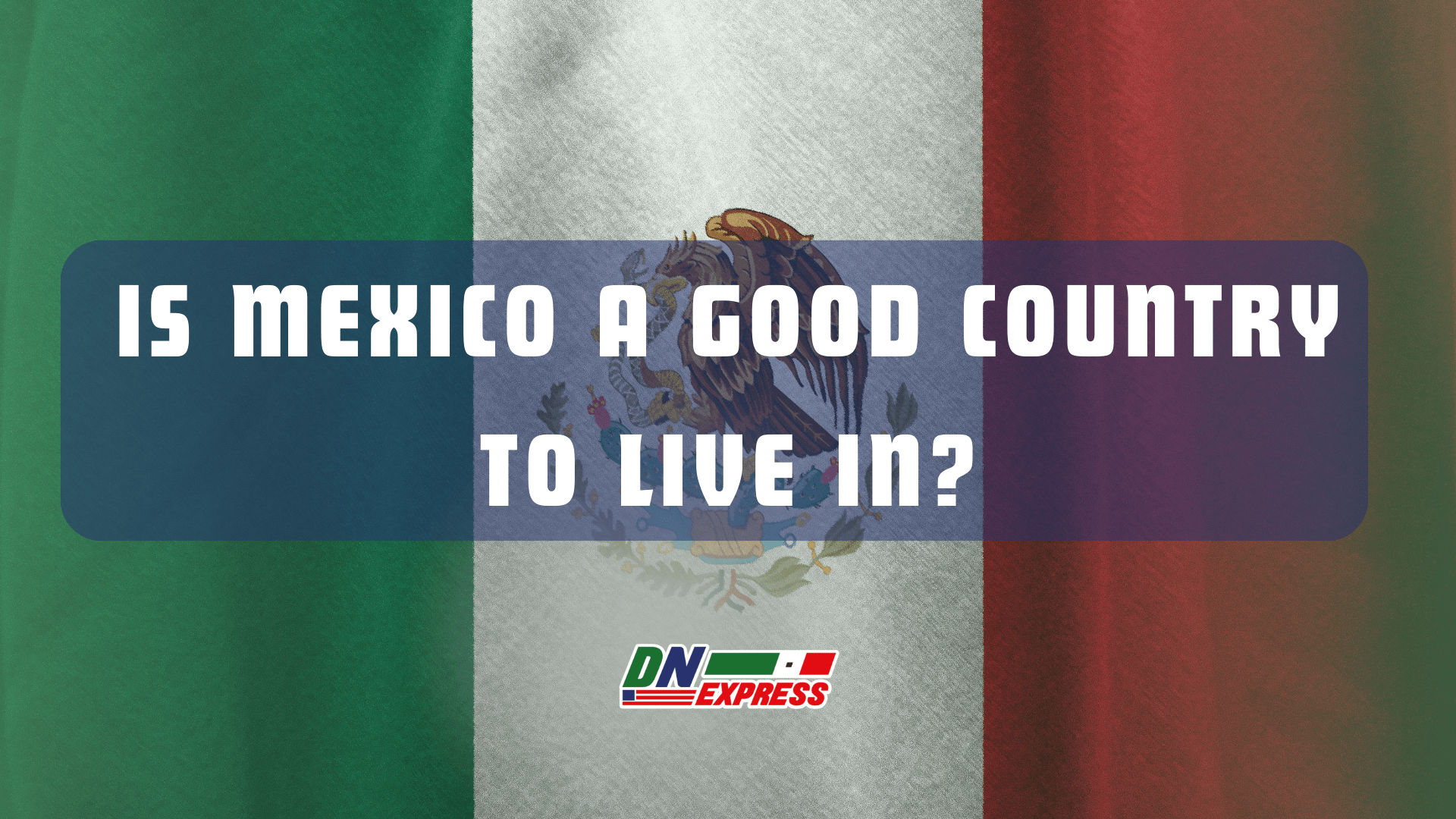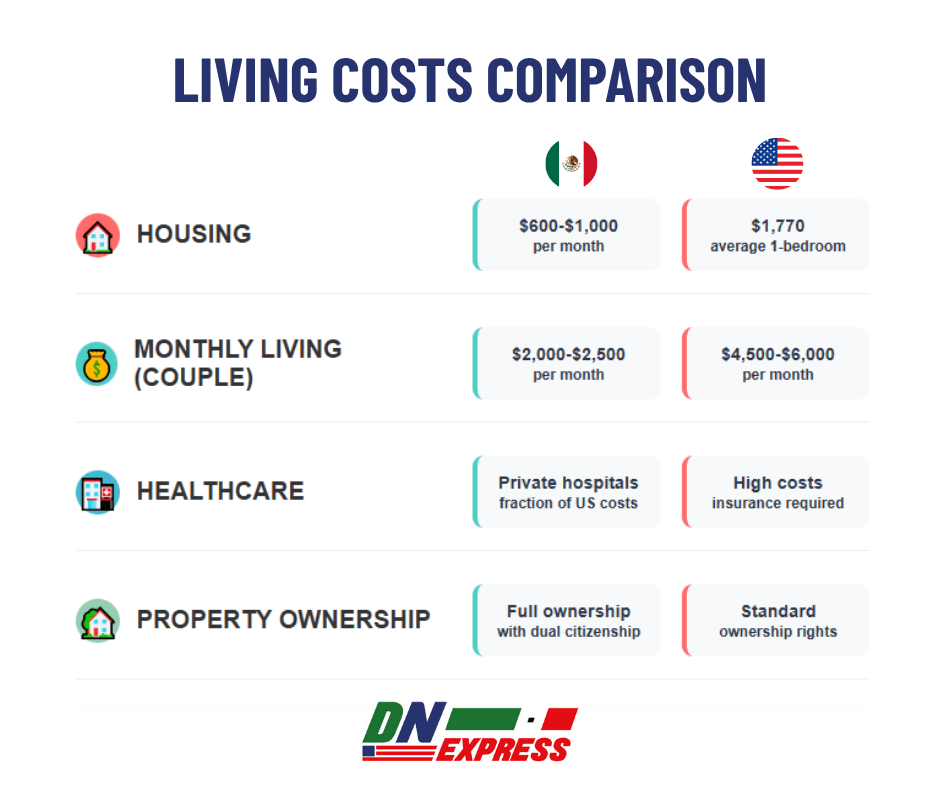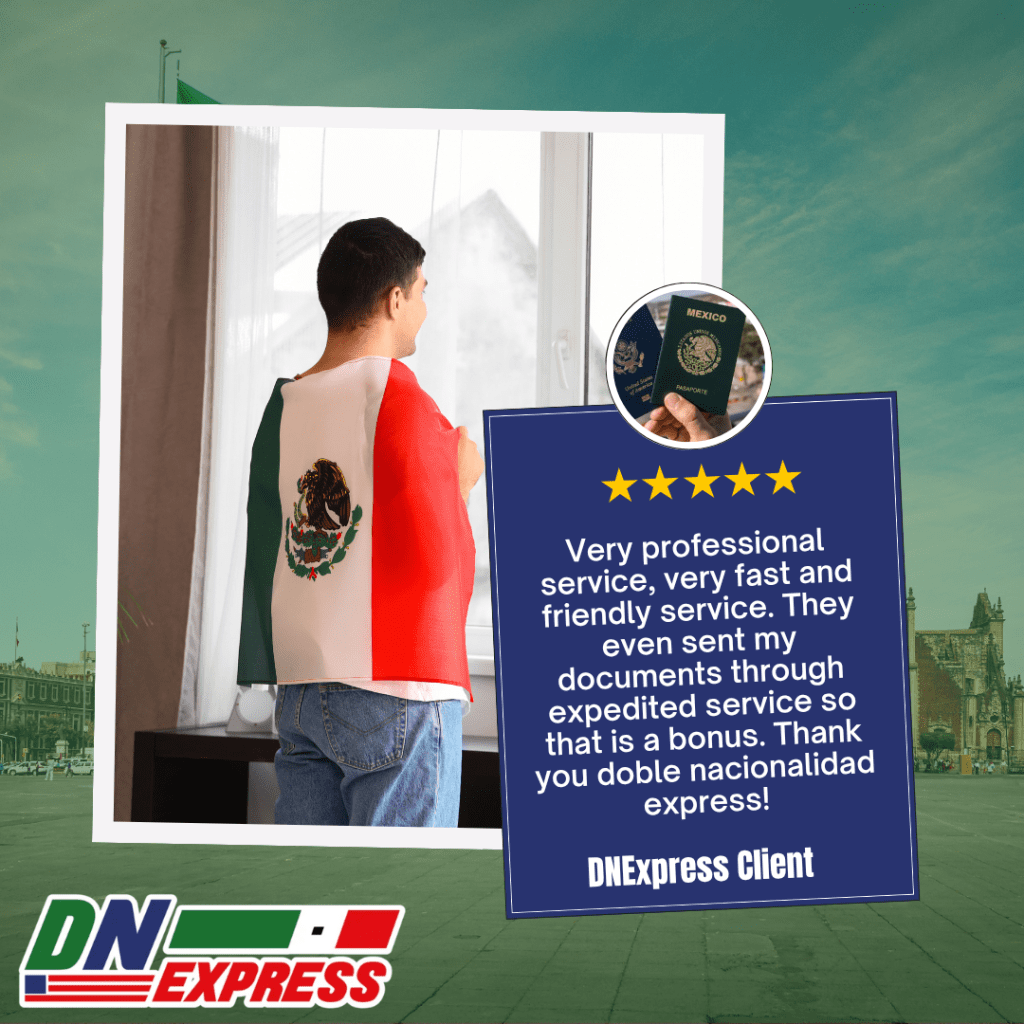
Yes, Mexico is a great country to live in for many people. With lower living costs, a rich culture, beautiful landscapes, and increasingly accessible healthcare and legal pathways, it's an appealing option for U.S. citizens, retirees, digital nomads, and families seeking reconnection.
Still, “great” looks different for each person. Whether you're reconnecting with your heritage, fleeing U.S. healthcare costs, or tired of jumping through consulate hoops, your reasons shape your experience. And not all of Mexico is the same.
From peaceful highland towns to buzzing beach hubs, the lifestyle varies wildly by region, budget, and goals.
We help U.S. citizens of Mexican descent reclaim their citizenship, secure Mexican passports for their children, and fix legal documents without ever stepping foot in a consulate. If you're exploring whether life in Mexico is right for you, our legal team can guide you every step of the way, remotely, reliably, and bilingually.
Want the full picture before you make your move? Keep reading. We'll show you exactly what it's like to live in Mexico today: pros, cons, lifestyle comparisons, and how to do it legally.
Yes, But It Depends on Who's Asking, Let's Break It Down
Whether Mexico is the “right” place to live depends a lot on who you are and what you need. The motivations behind moving, and how you legally structure that move, can make all the difference in how smooth, meaningful, or frustrating your experience becomes.
Let's look at the five most typical journeys we help our clients navigate.
For U.S.-Born Mexicans Seeking Cultural Reconnection
For many of our clients, this move isn't about cheaper rent or sunshine. It's about coming home. U.S.-born adults with Mexican parents or grandparents often feel disconnected from their roots.
Gaining Mexican citizenship is more than paperwork. It's a way to reclaim identity, preserve family language and traditions, and raise children who know where they come from.
We guide these families through the nationality recovery process step-by-step. They can finally feel legally and emotionally recognized on both sides of the border.
For Those Avoiding the Mexican Consulate
If you've tried getting anything done through a Mexican consulate lately, you know the drill. Endless appointments, unclear requirements, and months of silence, or rejection, with no explanation. Many of our clients come to us after wasting a year trying to do it alone.
The good news? You can skip the consulate entirely. Our remote services were built specifically for U.S. citizens who qualify for dual nationality or residency but want nothing to do with the consulate maze.
We handle everything: from birth certificate corrections to apostilles and CURP registration. All without you ever leaving home.
For Legal & Travel Freedom Seekers

If you've ever worried about overstaying a tourist visa or being stopped at a Mexican checkpoint, dual citizenship eliminates that fear completely. Mexican citizens don't need temporary residency cards. They can live, work, retire, and own property without renewals, without legal gray areas.
This is especially valuable for digital nomads and semi-retired professionals who want freedom of movement without immigration hassles. As a Mexican citizen, your right to stay isn't conditional. It's guaranteed.
For Those with Mexican Inheritance or Property
Do you stand to inherit land in Mexico? Or does your family own ejido property or older parcels tied to your lineage? If so, you'll likely need to prove your Mexican nationality to claim or manage these assets legally.
We've helped clients who nearly lost family land due to paperwork gaps or citizenship misunderstandings. Don't let your legacy get tied up in red tape, especially when it's fixable with the right legal team.
For Parents of U.S.-Born Kids
Securing Mexican nationality for your U.S.-born child isn't a formality. It's a gift. That little red passport gives them the legal right to study, live, and eventually work in Mexico.
It opens doors to binational opportunities for life. Learn more about the Mexican passport timeline.
We help families claim nationality for their children, even if the parent never registered their own birth properly or is unsure if they “still count” as Mexican. (Spoiler alert: they do.)
What's It Really Like to Live in Mexico?
Living in Mexico can be life-changing, in all the right ways. But it also comes with challenges that aren't always obvious until you're settled in.
Let's break down the real-world pros and cons based on what our clients experience every day.
Pros That Make Mexico Appealing
- Lower Cost of Living: For many, the biggest draw is financial. You can live comfortably on $1,500 to $2,500 USD a month depending on the city and your lifestyle. That often includes rent, food, healthcare, and even extras like household help.
- Choose Your Climate: Mexico's geography offers something for everyone. Prefer crisp mornings and mountain views? Try Oaxaca or San Cristóbal de las Casas. Craving beach life? Look to Puerto Vallarta or Tulum. Year-round warmth or mild seasons, it's up to you.
- Friendly, Welcoming People: Our clients often mention how surprised they are by the warmth of Mexican communities. Whether you're in a rural pueblo or a bustling city, people are generally kind, curious, and proud to share their culture. Integration is possible, even if your Spanish isn't perfect yet.
- High-Quality, Affordable Healthcare: Private hospitals rival the quality of U.S. facilities, but at a fraction of the price. Imagine seeing a specialist for $20–$40 or having dental work done without draining your savings. Many doctors are trained in the U.S. or Europe, and English-speaking staff are readily available in expat-friendly cities.
- Cultural Depth and Food Worth Moving For: Living in Mexico means waking up to fresh tortillas, wandering through mercados filled with chilies and mangoes, and experiencing a depth of tradition you won't find on vacation. Music, language, architecture, and celebrations are woven into daily life. And the food? It's delicious and soul-nourishing.
What Are the Downsides?
Even paradise takes some adjusting. Here's what many people aren't prepared for:
- The First Year Can Be Rough: Clients often say the honeymoon phase wears off around month six. Making friends outside expat circles is hard, and culture shock can hit harder during holidays or personal milestones. We always remind families: expect your first year to be a transition, not perfection.
- Bureaucracy Is a Reality: From registering property to dealing with immigration, the paperwork process can be slow, confusing, and inconsistent. One office may tell you one thing, another something completely different. That's why legal help isn't nice, it's necessary.
- Air Quality in Major Cities: If you're sensitive to pollution, cities like Mexico City or Guadalajara can be tough. Air quality often dips below U.S. standards, especially in dry seasons. Some clients opt for smaller, high-altitude towns where the air is cleaner.
- Homesickness Hits Different: Missing fall leaves, Thanksgiving with family, or your favorite American snacks can take an emotional toll, especially around U.S. holidays. Expats often stock up on comfort items when they visit home or learn to re-create traditions in new ways.
Mexico vs. U.S., Which Country Offers a Better Lifestyle?

There's no universal answer. But for the families and individuals we serve, Mexico often offers a lifestyle that feels richer, more grounded, and more affordable.
Here's how Mexico stacks up against the U.S. in the categories that matter most, based on OECD data on Mexico and other reliable sources.
Financial Comparison
Living in Mexico can cost a fraction of what you'd spend in the U.S. without sacrificing comfort. Most of our clients report monthly budgets between $1,500 and $2,500 USD, which covers housing, healthcare, food, transportation, and even household help in many cases.
In the U.S., that same lifestyle could easily cost $4,000 to $6,000/month, depending on the city. Mexico gives people room to breathe financially, according to cost of living data.
For some, it's the only way to retire with dignity.
Healthcare
Mexico's healthcare system is a major reason many Americans, especially retirees, make the move. Private care is widely available, high-quality, and significantly cheaper than in the U.S., as confirmed by WHO health statistics for Mexico.
A specialist visit can run $20–$40, and many prescriptions are available without the headache of insurance authorizations.
Yes, Mexico has free public healthcare (IMSS and INSABI), but the system is underfunded and inconsistent. Most expats choose private options for speed and comfort.
And no, there's no equivalent to U.S. Medicare. So planning ahead is key, especially if you have chronic conditions or expect to need long-term care.
Education
If you're moving with kids, here's what you should know: public education in Mexico is free, but resources can vary widely. Class sizes, teacher training, and curriculum often depend on the region and funding, as documented by the Mexican national statistics institute.
That's why many families opt for private bilingual schools, especially in cities with large expat communities. These schools often blend U.S. and Mexican curriculum and are far more affordable than private schools in the U.S.
This makes them a strong option for raising bicultural, bilingual children.
Safety for Americans
Safety in Mexico is nuanced. Some areas like Merida, Ajijic, or parts of Mexico City are statistically safer than many U.S. cities.
Others, particularly border towns or cartel hotspots, should be avoided.
Most expats feel safe when they stick to well-known communities, stay informed, and use common sense. Gated neighborhoods, walkable downtowns, and tourist zones often have a strong police or national guard presence.
That said, petty theft, carjackings, and scams are more widespread in certain regions. We recommend researching local conditions before deciding on a city, including reviewing the U.S. State Department travel advisory.
Where Most Americans Live in Mexico
Some cities have well-established expat hubs that make the transition smoother, especially if you're not fluent in Spanish:
- Lake Chapala / Ajijic: Known for retirees and a vibrant expat scene.
- San Miguel de Allende: Artistic, colonial, and deeply cultural.
- Puerto Vallarta: Coastal, LGBTQ+-friendly, and great for families.
- Mexico City (CDMX): Cosmopolitan, full of culture, and more affordable than U.S. metros.
More recently, expats are exploring Merida, Oaxaca, Puebla, and other lesser-known cities with deep local roots and lower costs.
DIY vs. DNExpress: What's the Smart Move for Your Citizenship?

Getting Mexican citizenship or registering your children for dual nationality might seem simple until you try doing it alone. We've seen clients spend months in a bureaucratic maze, only to be denied over a small document error.
That's where DNExpress changes everything.
Why DNExpress Clients Choose Us
We've built a system that works around the obstacles. So you don't have to fight them. Here's why thousands of clients across the U.S. trust our services:
- 100% Remote Services. No consulate appointments, no waiting rooms. We handle everything, from consultation to document delivery, right from your phone or inbox.
- Complete Document Processing. Need to fix your name on your Mexican birth certificate? Still missing a CURP or apostille? We do it all in one streamlined legal process with transparent pricing.
- Qualified Attorneys, Not Paper Pushers. Our cases are handled by licensed Mexican lawyers who know the legal system inside and out. Not clerks, not third parties, and never call centers.
- Proven, Trackable Progress. We've helped over 3,000 clients, many who were previously told “no,” successfully reclaim their Mexican nationality or register their kids.
You'll always know what's happening with your case, and you'll never feel left in the dark.
What Can Go Wrong if You DIY?
You absolutely can try this process yourself. But here's what usually happens when people go that route. Learn more about typical dual citizenship costs to understand the full picture:
- Months-Long Delays. If even one document is missing or mismatched, everything gets stalled. You may not even know there's an issue until it's too late.
- Rejected Applications. Mexican civil registries and consulates frequently reject birth certificates with incorrect spellings, date inconsistencies, or formatting errors, especially if you translated or filled them out yourself.
- Partial or Incomplete Submissions. Many people file for dual citizenship without realizing they also need CURP registration, apostilles, or legalizations to complete the process.
- Consulate Burnout. Trying to book an appointment can take weeks. Even if you succeed, being told “you don't qualify” because of an outdated rule, or simply dealing with a disinterested clerk, can leave you feeling stuck and defeated.
That's why we do things differently. You shouldn't need to fight for your identity.
You should be able to claim it with the legal support to back you every step of the way.
Is Mexico a Good Country to Live In?
Yes, for the right person, Mexico offers a deeply rewarding life. It's a country rich in culture, history, and community.
If you're looking to reconnect with your roots, stretch your retirement budget, or raise a family with bicultural values, Mexico can absolutely be the place to do it.
But it's not for everyone.
If you need everything to work like it does in the U.S., or if you're not ready for some emotional and legal adjustment, the first year can feel overwhelming. That's why we always recommend: visit first, talk to people who've done it, and get help with the legal stuff before you leap.
We've helped thousands of U.S.-based families make Mexico not a dream, but a legal reality.
Whether you're trying to fix a birth certificate, get a CURP, or secure dual citizenship for your kids, our bilingual legal team is here to make the process smoother, faster, and frustration-free.
Want to live in Mexico legally and stress-free?
Schedule a Free Case Review or Message Us on WhatsApp. Our attorneys can guide you step-by-step.
It will be a pleasure to help you on the road to your dual nationality.

FAQ
If you're seriously considering relocating to Mexico, chances are you've been quietly Googling questions like these late at night. Here's what you actually need to know, based on client experiences and what we see every day in our work. For a detailed cost analysis, additional research can help with planning.
What is the average price of a house in Mexico?
$100,000 to $300,000 USD is the sweet spot for most homes in walkable, middle-class neighborhoods, especially in inland cities like Querétaro, Puebla, or parts of Oaxaca. Coastal or tourist zones like Tulum, Sayulita, or Puerto Vallarta can be pricier, with luxury condos and beachside homes reaching $500K+.
Good deals exist, but buying as a foreigner requires caution. You'll need to work with a notario (Mexican legal official), and if the property is in a restricted zone (like near the coast), you'll likely need a fideicomiso (bank trust).
We always recommend legal guidance before putting down a deposit.
Do I need to speak Spanish?
Not to survive, but definitely to thrive.
In cities with large expat communities, you can get by with basic Spanish or even English. Restaurants, banks, and healthcare providers often have bilingual staff.
But deeper integration, building local friendships, understanding local humor, and avoiding misunderstandings, comes much faster when you make an effort to learn the language.
Some of our clients label items in their homes in Spanish, create bilingual grocery lists, or hire tutors to ease the transition. It's not about fluency. It's about connection.
Will I feel welcomed as an American?
Yes, overwhelmingly so. Mexico has a long history of hosting foreigners, especially from the U.S. Most locals are warm, respectful, and even curious about Americans living among them.
That said, your attitude matters.
Clients who show humility, respect the culture, and try to adapt, even a little, tend to build the strongest relationships. And yes, you're likely to be invited to birthdays, baptisms, and neighborhood tamaladas faster than you'd expect.
What is the downside of living in Mexico?
It's not only logistics, it's emotional, cultural, and legal adjustment. With the right expectations and support, though, the benefits often outweigh the bumps.



